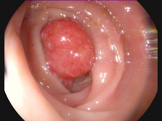The Procedure
What is a colonoscopy procedure?
Colonoscopy is the visual examination of the inner surface of the intestinal .tract via means of an endoscope. A long flexible tube (colonoscope), about the thickness of a finger, is inserted into the rectum and advanced along the length of the large bowel (colon). The scope contains a video camera that produces a magnified image of the lining of the large bowel to a TV screen.
Colonoscopy is commonly used for removal of colonic polyps, to identify abnormalities (including cancers), to coagulate bleeding sites, to obtain biopsies, and for other diagnostic purposes.

How do I prepare for the procedure?
It is very important that you follow the preparation instructions provided. These instructions outline what food and drinks are permissible for 48 hours before the test and what laxatives are required to ensure that your bowel is empty. The bowel preparation must be started on the day before your scheduled test. Contact the clinic to determine which instructions you need to follow (most forms are located on the website Home Page).
Please also refer to other documents in the Patient Instruction section of this website. You will be asked to read and sign the consent form prior to the procedure taking place. If you have difficulty with the English language you must bring a friend of family member to act as a interpreter for you.

What can I expect during the procedure?
The procedure itself will take 20-30 minutes, however please allow for 2 hours at the clinic for pre and post procedure assessments.
An intravenous (IV) will be started so that the doctor can give you sedating medication to make you feel relaxed and sleepy. You may be awake during the procedure but will be unlikely to remember specific details. You may feel uncomfortable for short periods of time during the test because air is used to inflate the bowel.
There is a 1:1000 chance of perforation and a 1:100 chance of bleeding (up to 10 days later) if a polyp is removed. There is a < 5% chance of missing a sizeable polyp or significant lesion (the risks are higher if your bowel is not cleaned adequately).

What can I expect after the procedure is over?
Your pulse, respiration, and blood pressure will be checked. You may feel bloated and have some abdominal cramps.
You must not drive for 12 hours post sedation. Please make arrangements for someone else to drive you home after the procedure. If you go by bus or taxi someone must accompany you.
Unless your doctor tells you otherwise, you may resume your regular diet immediately after you have had the test. You can go back to work the next day.
The results of the procedure will be given to you immediately after its completion. A copy of the report will be sent to your referring doctor.












